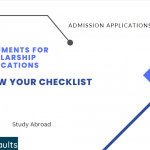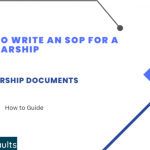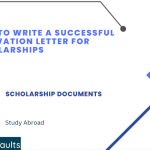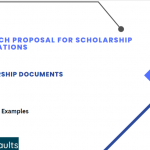How to Write Academic CV for Scholarships : Scholarship Documents How to GuideJune 10, 2024 by Digital Vaults Editorial Team
Have you ever wondered about how to make an academic CV for scholarships? Applying for a scholarship is a huge decision, but making the right first impression is vital. Fortunately, our friendly experts are on hand to help with this; we’ve outlined some of the key things you need to know about making an academic CV for scholarships to ensure you get the ideal solutions for your own scholarship needs.
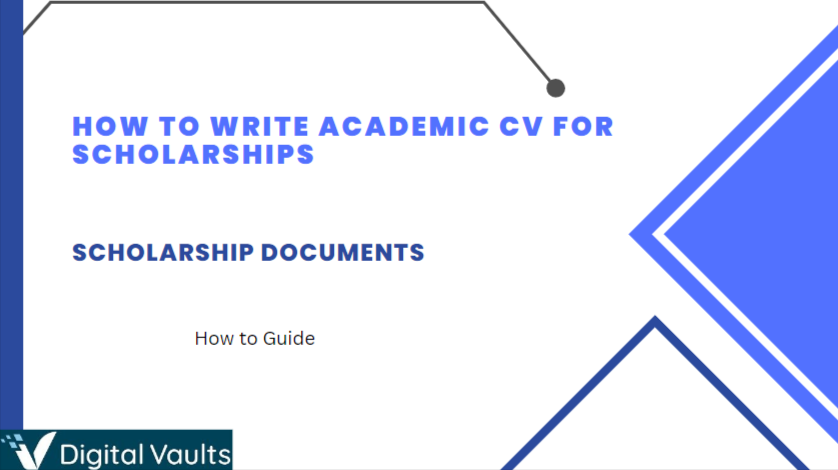
Is an Academic CV for Scholarships Important?
Before we go any further, it’s first important to clarify whether academic CVs are important for scholarship applications. Overall, however, there is no doubt that a professionally written academic CV will greatly influence your scholarship application. Indeed, your academic CV outlined some of the main things the university or scholarship provider will need to know about you.
Your CV provides the university with a clear insight into who you are. In addition, an academic CV is also an insight into your writing style and experience.
In other words, a carefully made academic CV is vital for your scholarship application since it provides the information the university will need to see. However, it would help if you always ensured your academic CV is written carefully. A poor academic CV can do more harm than good for your university or scholarship application. As such, taking time to consider the essential features of a good academic CV is vital.
You can find details about preparing scholarship documents here.
How to Make an Academic CV for Scholarships?
Making an academic CV for scholarships isn’t that difficult, so long as you follow a few simple steps. Fortunately, the following eight tips will help you lay out and structure your new academic CV. This should give you the best chances.
#1 Start with the Basics
Before you get properly with your academic CV, you should start with the basics – for example, your basic contact details, including your name, date of birth, role/specialty, email address, phone number, and academic affiliation.
This section should be very brief. A quick summary of each point will be enough. Ensure the layout of this section is done effectively; it should be quick and easy to view for anyone reading your academic CV.
#2 Provide an Introduction and Objectives
Once you have introduced yourself to the basics, you can write an introduction and summarize the main objectives of your scholarship. In other words, what do you hope to achieve if you achieve the scholarship?
Outlining a summary of your main achievements and how these relate to your application will provide a thorough overview of why you might be a good candidate. Remember: first impressions count for everything, and showing the assessor your main skills in this section can help ensure they know why you would be good for the scholarship. Remember: scholarships are often incredibly popular, so there can often be a lot of competition for them! Accordingly, you’ll need to put your best foot forward at every opportunity if you genuinely want to win the scholarship.
#3 Outline Your Education
Now that you’ve provided a basic introduction and objective, the next step is to include your education. Generally speaking, most scholarship applicants’ education history will be the strongest part of their application; as such, highlight your key areas of academic success in this section.
Please don’t leave it to chance for the assessor to guess. You should draw attention to any achievements to ensure they know where your strongest skills lie. Don’t forget to reference any additional education or courses you may have completed as part of this section as well.
#4 Experience
Now that you’ve outlined the main education section of your CV, the next section to complete is the experience section. Your experience may be somewhat lacking if this is a new field of study you’ve not entered. However, it’s important to provide a relevant experience that could contribute to your scholarship. For example, perhaps you have completed work experience with a company in a similar field. Or maybe you have worked on a personal project in the domain that has achieved success?
Highlighting these in the experience section can add value and credibility to your application. After all, there’s a very big difference between the world of work and the world of education. Showing you can apply your skills in both will be a huge boost.
Join our Telegram Channel to Get the Latest International Scholarship Alerts and Tips.
#5 Skills
The skills section of your academic CV offers an opportunity to show the skills and traits you gained during your work experience and education. Common skills might include time-keeping skills, interpersonal skills, and so on. Ideally, ensure your experience, and education sections demonstrate the skills you list here to add credibility to your CV.
#6. Languages
You could immediately receive a huge boost to your CV if you speak multiple languages. Indeed, assessors often like to see an individual who is competent not only in their native tongue but also in other languages. This demonstrates a keen determination to learn, so list any languages you speak. Mark them by their fluency level (e.g., native, fluent, semi-fluent) to further support your application.
#7. Awards, Honors, and Publications
If you have previously won any awards or honors for your work in a particular field, include this in your CV application. Similarly, if you have any published works, be sure to include those here as well to demonstrate your academic skills.
#8. Proofread Your Scholarship CV!
At this point, all that’s left to do is to proofread your scholarship CV. Of course, you should check the CV thoroughly for any spelling errors and typos that could reduce the professionalism of your CV. When applying for a scholarship, simple errors are a major no, as these can indicate to the assessor that you might not have the necessary writing and proofing skills to complete a full scholarship thesis thoroughly and accurately.
However, in addition to typos, you should check your scholarship to ensure it is engaging to read (not dull!), accurate, and thorough. If you think you may have missed any experience at this point, be sure to add it so that the assessor gets a comprehensive view of who you are and why you’re a good candidate.
Tips for Creating a Good CV
At this point, we’ve outlined the basics of creating a good academic CV. However, once you’ve completed your academic CV, it’s important to consider the following key tips to ensure you don’t end up writing an uninspiring CV that doesn’t allow your main attributes to shine through.
What if I Don’t Have Experience?
If you don’t have any relevant experience in the scholarship’s specific field, it’s still important to demonstrate how your skills will apply. If you developed transferrable skills in other job roles, be sure to mention these and highlight exactly what you learned from your past roles.
If you don’t have any experience, try to focus on your qualifications, education, and the skills you hold naturally.
How Long is an Academic CV Usually for Scholarships?
Generally, an academic CV is usually around two to four pages long for a scholarship application. Finding a balance between including plenty of information and not becoming so long that the CV becomes dull and uninteresting can be hard, so if you’re not sure, read it over to yourself several times. If you struggle to reach the end, an assessor may too.
How Soon in Advance Should I Write an Academic CV?
It would be best if you write your academic CV as soon in advance as possible. It’s always possible to edit, change, and add new skills and experiences to your CV later if needed. As such, ensure your CV is ready as soon as possible. This means you’ll be able to submit the CV when the time comes without delay easily. Getting your CV delivered on time always looks good on your application.
What Should I Leave Out From an Academic CV?
While you can include any relevant information on your academic CV, most people agree to leave out information such as age, ethnicity and physical attributes, sexual orientation, etc. Your academic CV should heavily focus on your skills, experience, and knowledge rather than other traits (unless they specifically make you a better-suited candidate for the scholarship).
What’s the Best Way to Write an Introduction?
Your academic CV’s introduction should be a very simple paragraph, usually. However, ensure that your introduction briefly covers who you are and your most important attribute or achievement. For example, suppose you already have a degree in a certain field with years of experience. In that case, you could introduce yourself as a degree graduate with “X” years of experience in the area. This immediately demonstrates to the reviewer that you are suitably qualified to apply for the scholarship.
Final Thoughts
Undoubtedly, an academic CV for scholarship applicants is vitally important. However, if you’ve been feeling unsure, please don’t hesitate to contact us for further support on academic CVs and how these could help with your scholarship application. You might find this transforms your success with applying for scholarships.
